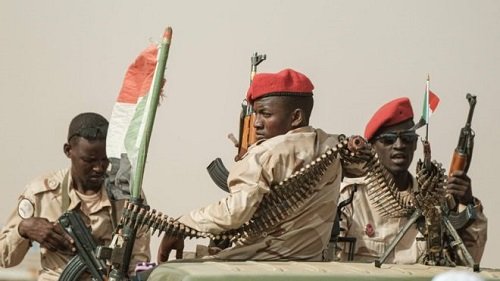The Rapid Support Forces (RSF) have been accused of widespread abuses in Sudan, including the June 3 massacre in which more than 120 people were reportedly killed, with many of the dead dumped in the River Nile. Sudan expert Alex de Waal charts their rise.
The RSF are now the real ruling power in Sudan. They are a new kind of regime: a hybrid of ethnic militia and business enterprise, a transnational mercenary force that has captured a state.
Their commander is General Mohamed Hamdan “Hemeti” Dagolo, and he and his fighters have come a long way since their early days as a rag-tag Arab militia widely denigrated as the “Janjaweed”.
The RSF was formally established by decree of then-President Omar al-Bashir in 2013. But their core of 5,000 militiamen had been armed and active long before then.
Their story begins in 2003, when Mr Bashir’s government mobilised Arab herders to fight against black African insurgents in Darfur.
The core of the Janjaweed were camel-herding nomads from the Mahamid and Mahariya branches of the Rizeigat ethnic group of northern Darfur and adjoining areas of Chad – they ranged across the desert edge long before the border was drawn.
During the 2003-2005 Darfur war and massacres, the most infamous Janjaweed leader was Musa Hilal, chief of the Mahamid.
As these fighters proved their bloody efficacy, Mr Bashir formalised them into a paramilitary force called the Border Intelligence Units.
One brigade, active in southern Darfur, included a particularly dynamic young fighter, Mohamed Dagolo, known as “Hemeti” because of his baby-faced looks – Hemeti being a mother’s endearing term for “Little Mohamed”.
A school dropout turned small-time trader, he was a member of the Mahariya clan of the Rizeigat. Some say that his grandfather was a junior chief when they resided in Chad.
A crucial interlude in Hemeti’s career occurred in 2007, when his troops became discontented over the government’s failure to pay them.
They felt they had been exploited – sent to the frontline, blamed for atrocities, and then abandoned.
Hemeti and his fighters mutinied, promising to fight Khartoum “until judgement day”, and tried to cut a deal with the Darfur rebels.
A documentary shot during this time, called ‘Meet the Janjaweed’, shows him recruiting volunteers from Darfur’s black African Fur ethnic group into his army, to fight alongside his Arabs, their former enemies. –BBC

